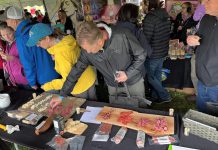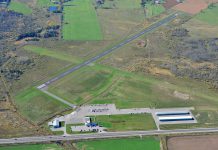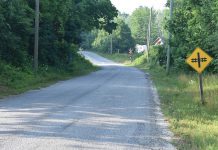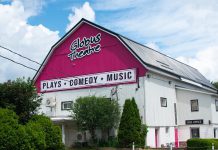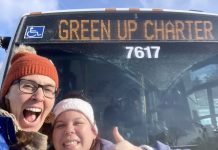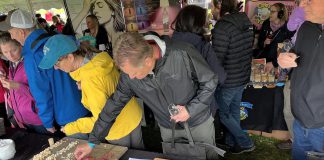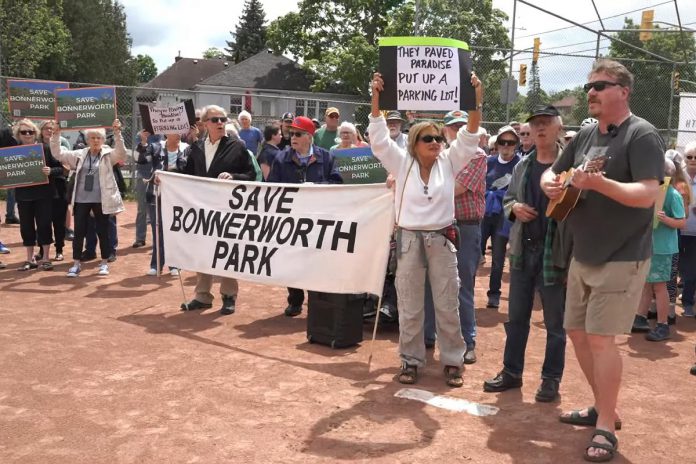
Armed with Churchillian determination and unwavering despite a number of setbacks, a citizens’ group fighting to maintain Peterborough’s Bonnerworth Park as a cherished urban greenspace captured countless headlines throughout 2024.
As the year draws to a close, Friends of Bonnerworth Park remains active, its members determined to have some influence on what the park’s redevelopment as a $4.1-million 14-court pickleball complex, a new bike pump track, and an associated parking lot will ultimately look, feel, and sound like.
From the outside looking in, with the park off Monaghan Road south of Parkhill Road currently resembling a moonscape, it would appear there’s not much left to fight. Work on the park’s redevelopment, which began in early November with the removal of two ball diamonds along with trees and grass, will recommence in the spring — a certainty resulting from Friends of Bonnerworth Park’s decision to withdraw its notice of an application for a stop-work injunction when its scheduled November hearing was bumped to spring 2025.
Still, Friends of Bonnerworth Park isn’t going away, its legal expense chest brimming with $43,486 in GoFundMe-solicited funds, and its plan to have influence in terms of what the redeveloped park’s impact on the neighbourhood it resides in being formulated as the calendar flips to a new year.
There are two stories here: one being the litany of 2024 twists and turns related to the park’s redevelopment plan and Save Bonnerworth Park’s efforts to have the project paused or stopped altogether (see the timeline below), and the other being the power of citizenry when, en masse, it determines a wrong has been committed and seeks to have it corrected.
Speaking to the latter, the message is you can fight city hall. You might not win that battle but you can fight, and should do so, when a perceived misstep is committed by those elected to serve the best interests of those they represent.
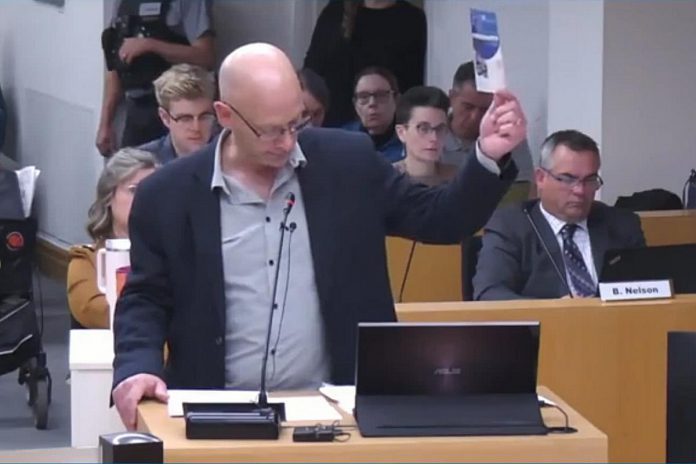
According to Friends of Bonnerworth Park co-director John Gerelus — he shares that role with Richard Scott, Jen Burnard, and Scott’s sister Deb — there were indeed times when it proved difficult for the group to stay on course.
One disheartening setback in particular came in November when the group learned its notice of an application for a stop-work injunction wouldn’t be heard in court November 25 as scheduled but rather the following spring, well after the city will have resumed redevelopment work on the park, leading the group to question whether it should continue its fight against city hall.
“It’s not up to me or the directors to say ‘Yeah, we’re done’,” says Gerelus, referring to the public meeting the group held on December 4. “We needed to have that meeting and present the options and the chance of success for each one. The cost of each one and the time required, and resources need, so everybody can contribute on the decision to continue or not. For us to say ‘Yeah, it’s over’ and walk away isn’t fair to anybody. I don’t want say we’re too far in, but we’re in deep.”
“We’ve impacted the project. It was due to be started in September. We delayed it as much as we could, so that was a win. But, yeah, when the shovels went in the ground and we had to withdraw our (court) application, that was a tough couple of weeks. We made the decision to take a break over Christmas and come back in the new year and just see where we are.”
That decision was shared with the group on December 4 when some 60 of its number showed up for a meeting at St. Peter Catholic Secondary School on a snowy and driving-hazardous night. Among those present was city councillor Joy Lachica, a staunch ally of the group’s efforts since day one. Also on hand was her council colleague Keith Riel who, along with councillor Alex Bierk, has also been consistently supportive of the group’s fight.
“Regardless of bulldozers and upturned greenery, we can’t be daunted by the things that are in front us,” Lachica says. “We live with belief that’s driven by our values and we continue to fight for what’s best, to fight for what’s right, regardless of what we may see in front of us that doesn’t align with that belief.”
A strength of Friends of Bonnerworth Park, according to Lachica, can be found in the fact that “members of the group are so diverse and multi-talented. They have expertise in areas related to that space. That’s really made a difference in the work it has done to build community and to build strength around what its members believe in for that urban community park.”
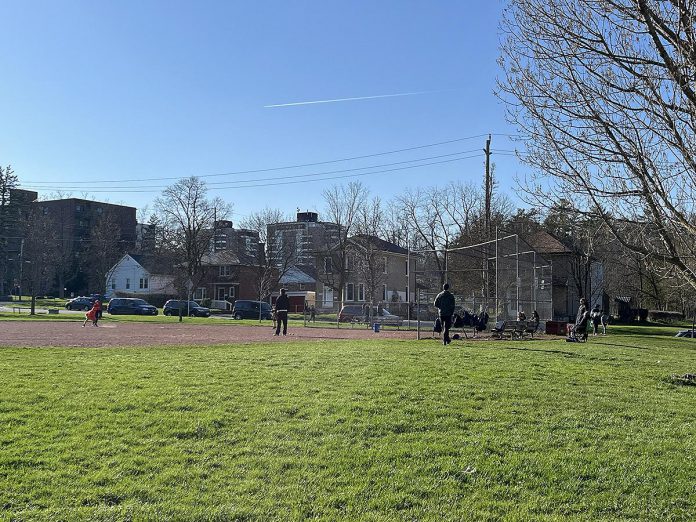
“People with parks backgrounds, planning backgrounds, engineering backgrounds — it’s a fusing of many skills and abilities,” Lachica says. “And not only that, there are relationships that have been built over time. They’re the ones that have been users of that wonderful open greenspace.”
“One can look at a journey like this as a community growing in terms of the power needed to build the things that are foundational — climate action, sustainability, the roots of what makes communities hum and thrive and grow. Parks are a vital component of making our spirits thrive and be alive. This group has achieved that in a huge way and continues to.”
In a statement shared with kawarthaNOW, Lachica expressed that her “heart” this holiday season remains with Bonnerworth Park area residents, sympathizing with children “who are abruptly without the winter playground they’ve known and treasured.”
“When cities choose to appropriate legacy community spaces like an urban community park, access to an irreplaceable ‘plein air’ connection to one another is also sacrificed. The immediacy, the proximity to peace, to space, to open equitable use, is lost. This is the very purpose and function of urban community parks and greenspace according to our own City of Peterborough Parks Development Standards 2019, which informs our current Official Plan.”
While Friends of Bonnerworth Park organized in earnest back in early April, when city council first publicly debated the redevelopment project, the roots of the group’s formation can be traced back to October 2023 when the plan was first floated at city hall.
“The rumour mill was swirling because it wasn’t clear what was happening, so we thought we should alert the community,” recalls the group’s co-director Richard Scott.
“We started delivering flyers in the neighbourhood. That got the ball rolling. Then, when we received notice of the upcoming consultation and open house, we moved into gear. The people we spoke with didn’t have any clue about what was going on. We were very much in the dark. We knew something was happening. We didn’t know how it happened, what the city had approved, if the city had approved it — which we found out it had. It was obvious the city hadn’t consulted anybody in the community.”
The March 21 open house, maintains Gerelus, presented a plan for the park that was “a done deal.”
“One of our neighbours stood up on a chair and said ‘If anybody wants to get involved, let’s get an email thread going and start figuring out what’s going on’.”
Gerelus adds that was the beginning of the Save Bonnerworth Park group, which later in the year morphed into Friends of Bonnerworth Park.
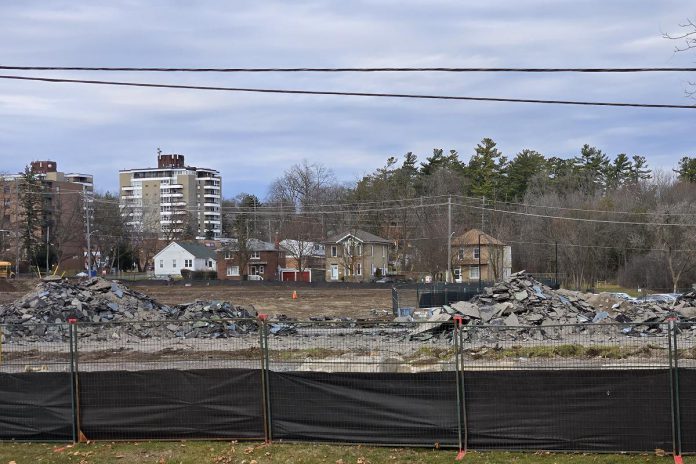
Over the course of the year, Peterborough Mayor Jeff Leal — a consistent supporter of the redevelopment project — drew the brunt of the group’s ire.
While he restricted most of his comments on the issue to council discussions, Mayor Leal shared with kawarthaNOW what he perceives as the need for a pickleball complex and his desire to see it developed at Bonnerworth Park. History, he says, has shown Peterborough has responded to recreational needs as identified and this is no different.
“If you go back to 2018, the city recreation division did a thorough analysis of needed recreation infrastructure,” he says. “Pickleball was coming on the scene and they determined there was going to be a need for pickleball courts. They hadn’t identified a site, but they identified the growing participation in the sport.”
The mayor provided several other past examples of development projects to build city recreational facilities to meet the demand for growing sports.
“In the 1990s, when the level of participation in slo-pitch was increasing dramatically, the recreation division identified the need to provide infrastructure for slo-pitch. We did (provide the infrastructure). We partnered with Fleming College and built Bowers Park.”
“At the same time, it emerged that new ice surfaces were needed to accommodate the growth of women’s hockey. We built the Evinrude Centre (now the Healthy Planet Arena). We needed to add capacity and we did. Fast forward and my predecessor, Mayor (Diane) Therrien, and her council looked at what infrastructure was needed and approved the Miskin Law Community (Complex). There’s a long pattern of the city identifying recreational needs and constructing the infrastructure that’s needed.”
“What has been missing through all this discussion is the companion project at Knights of Columbus Park (off Park Street), which will see the building of new tennis courts, an enhancement of the bowl for pickup lacrosse and ball hockey, and a new splash pad to replace the antiquated wading pool that’s there now. There will be a second regional park to meet the needs of the community.”
As for the determination that Bonnerworth Park is the best site for pickleball courts, the mayor says that, while two ball diamonds are being lost, “they were inadequate for adult play” due to their close proximity to neighbouring streets.
He adds the ball diamond at Morrow Park’s east end will be playable again when the work is completed at the Miskin Law Community Complex, adding the city is also “looking at opportunities with both our school boards” to repurpose existing ball diamonds on school properties.

Meanwhile, Mayor Leal says the argument that limited city dollars should be spent on more pressing issues, such as homelessness and infrastructure in need of repair, is the “same argument” that preceded the development of other recreational amenities.
“There’s always competing priorities for every budget dollar,” he says. “We can spend every budget dollar we have funding homelessness but, if you do that, you do it to the detriment of all other community needs and interests.”
Speaking to Friends of Bonnerworth Park’s principal concern over the loss of urban greenspace, Mayor Leal says that, once the park’s redevelopment is done, “There will still be 63 percent (of the park) that is greenspace.”
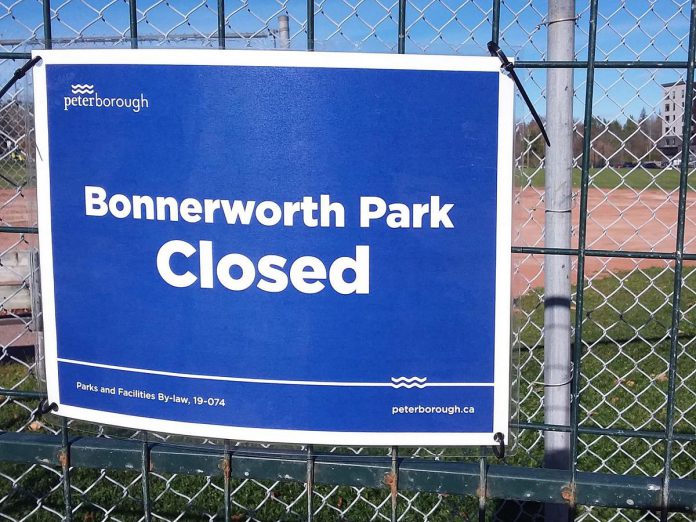
Mayor Leal claims some of those who are against the Bonnerworth Park redevelopment supported a proposed and highly controversial highway extension through Jackson Park.
“I find it somewhat ironic that the same people that are talking about preserving greenspace at Bonnerworth Park, and I respect that, are the same people in the late 1980s and 1990s (who) were prepared to bulldoze a vast swath of Jackson Park to accommodate a four-lane arterial road and bridge for The Parkway.”
Still, despite the consternation that has evolved between himself and those opposed to the Bonnerworth Park redevelopment, the mayor says he respects the group’s right and willingness to call the city and council to task.
“It’s a very important part of democracy. When there’s great discussion about public policy, that’s part of the democratic process. At the end of the day, as my late father used to say, you agree to disagree. I think that’s the case here.”
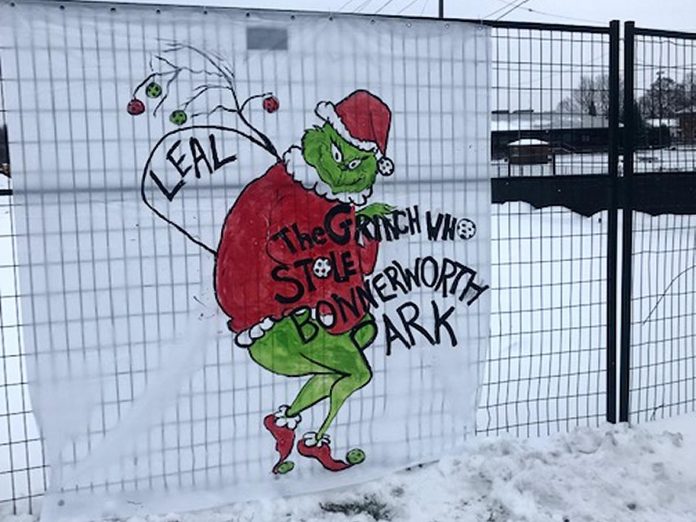
That does little assuage either Gerelus or Scott.
“If this whole debacle has taught us anything, the city needs to sit down with individual communities where they’re proposing facilities (be built) before any decisions are made,” says Scott.
“I haven’t heard any admission by the city that they will do things differently in the future. The city, in no way, can be proud of this process and its outcome. This should end up in a planning textbook of how not to do things. To says they have a successful process and outcome is a disservice to every resident of this city.”
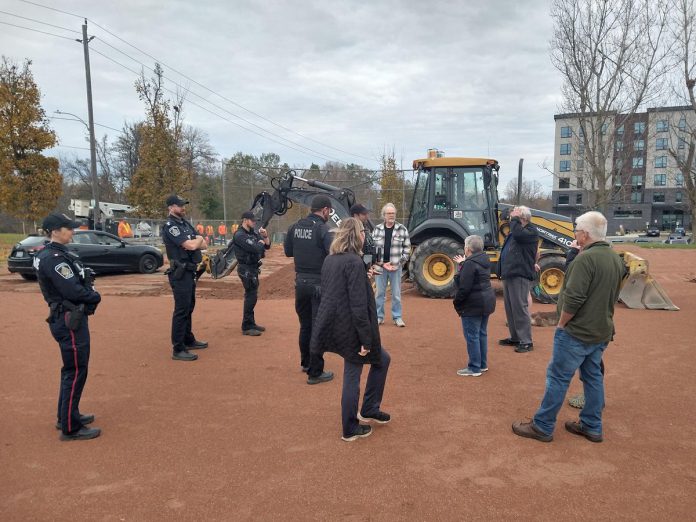
Now, as Friends of Bonnerworth Park considers next steps — a list ranging from considering a possible lawsuit to seeking active input in the park’s design — its directors are hopeful other communities that are fighting municipal decisions will learn and benefit from their organized efforts and advocacy.
“There are Facebook groups and other groups across Ontario, Canada, and the U.S. that are watching us,” says Gerelus. “We will proudly wear the moniker ‘Let’s not have another Bonnerworth,’ bringing attention to guidelines and rules around where you can put pickleball courts. They’re non-existent now.”
“People are telling their stories about living next door or close to pickleball courts and the effect on their quality of life, their everyday use of their home, and their mental health. They’re winning lawsuits and they’re getting courts closed, but there’s no legislation that guides municipalities.”
“If our actions help create guidelines, that’s great. We’ll take that.”
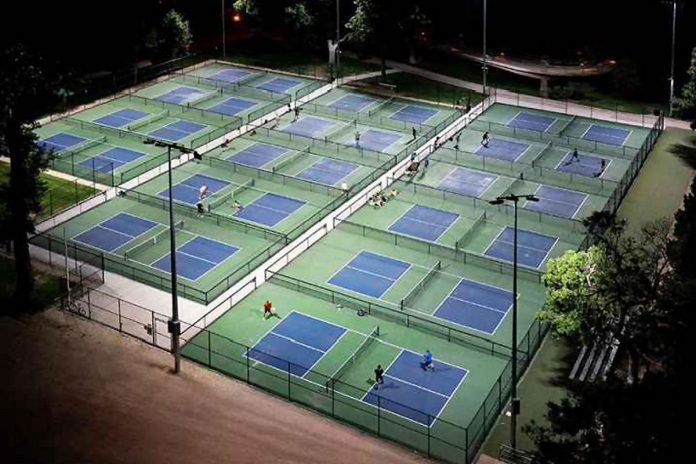
Key moments in 2024 in the Bonnerworth Park redevelopment saga
- April 2: Meeting as general committee, city council votes to proceed with a planned $4.4-million redevelopment of Bonnerworth Park that will see 16 pickleball courts, a bike ‘pump’ track and a parking lot developed, replacing two ball diamonds and much of the park’s greenspace. As a crowded gallery of park-neighbouring residents watch on, councillor Joy Lachica’s motion to pause the project to allow for consultation with park users is defeated by a vote of 8 to 3, with councillors Alex Bierk and Keith Riel supporting her motion. The heated discussion included Mayor Jeff Leal telling councillor Alex Bierk he “would carve him like a Thanksgiving turkey” after Bierk had referred to borrowing a pickleball racquet from the mayor’s wife, who he mentioned by name, contrary to council protocols.
- April 8: After a marathon five-hour meeting that included several delegations speaking for and against Bonnerworth Park’s redevelopment, city council reaffirms its decision to move ahead on the project, with councillor Lachica’s motion of the week prior losing again by an 8-3 vote, again her only support coming from councillors Bierk and Riel. Mayor Leal apologized to councillor Alex Bierk for the “intemperate language” he directed at Bierk at the previous week’s meeting.
- April 25: Park-neighbouring residents and supporters organize as Save Bonnerworth Park, launching a website and related online petition that urges ‘city council to consider the impact on our community before proceeding’ with the park’s redevelopment. Within five days, close to 1,300 signatures are garnered — a number that would eventually balloon to more than 8,000. Meanwhile, Save Bonnerworth Park lawn signs, made available by the group, start appearing in neighbourhoods across the city and even in the county.
- May 13: Councillor Joy Lachica, frustrated by what she sees as a lack of council oversight on the park’s redevelopment, puts forth a motion that council be granted final plan approval authority, and calls for the provision of a staff report detailing the recommended site plan, final technical studies related to parking, traffic, noise, stormwater management and geotechnical considerations, a record of stakeholder and community consultation related to studies and the site plan, and the budget apportioned for each aspect of the contracted construction work. After the general committee chair councillor Andrew Beamer rules her motion out of order and six of 11 councillors back that ruling, the opportunity for any council discussion around her motion is lost.
- May 18: A rally, organized by retired priest Father Leo Coughlin who lives at park-neighbouring Marycrest at Inglewood seniors’ complex, is held at Bonnerworth Park. Saying “The common good is not being served,” Father Coughlin says those living at the Monaghan Road complex have “fear and anxiety over the noise (generated by pickleball play) that will disturb their final years … the level of disrespect is tremendous,” adding “The park has moved from inclusion to exclusion. Anybody should be able to see that’s wrong.”
- June 10: Save Bonnerworth Park holds a rally outside Peterborough City Hall just prior to a city council meeting inside. Billed as a “Rally For Answers”, the group puts forth 16 questions it says city council needs to answer, including “Why has the city not considered sites other than Bonnerworth Park?” and “Why the urgency to build this development?” The rally follows a posted city statement that maintains studies, including those examining noise and traffic, will inform the final design, and notes the city doesn’t have enough facilities to accommodate the growing sport of pickleball.
- June 27: City council receives a proposal from then Peterborough and the Kawarthas Chamber of Commerce CEO and president Sarah Budd that reveals that Don MacPherson, the owner of the long-vacant former Baskin-Robbins property, is “very interested” in pursuing talks with the city that would see the pickleball complex located there. The city, however, dismisses that option outright. In a statement, it says purchasing the property, which the city has identified as a prime location for residential or a mixed commercial-residential development, “would potentially add millions of dollars to the project cost.”
- August 13: A new draft plan for Bonnerworth Park’s redevelopment, prepared by Landscape Planning Landscape Architects, is presented to the city’s Arenas, Parks and Recreation Advisory Committee and the Accessibility Advisory Committee. The new plan proposes a reduction in the number of pickleball courts, from 16 to 14, fewer parking spots and noise mitigation measures. In addition, some 275 new trees would be planted, with 63 per cent of the park reserved for grass and landscaped areas. As city council had already approved the park’s redevelopment, no vote was sought from, or required of, either committee.
- November 6: Now known as Friends of Bonnerworth Park and having hired legal representation, the citizens’ group fighting the park’s redevelopment serves the city with a notice of an application for a stop-work injunction. The injunction, scheduled to be heard November 25, calls for the by-law governing the park’s redevelopment to be squashed and that the development be stayed until the case is heard. Of note, the injunction is served on the same morning that heavy machinery continued removing clay from one of the park’s two ball diamonds — a move which drew a number of residents to the site and led to words between them and workers as city police and private security guards kept the peace.
- November 11: Friends of Bonnerworth Park suffers two setbacks in its fight, learning that its notice of an application for a stop-work injunction won’t be heard by the Superior Court of Justice until spring 2025 at the earliest, and then learning that the legal firm it hired, Kitchener-based Kramer LLP, is closing due to the ill health of the firm’s lead lawyer. As the city pledges to fight any injunction filed, work continues at the park as it is fenced off and completely closed to the public.
- November 22: Friends of Bonnerworth Park withdraws its application for a stop-work injunction and suspends its GoFundMe campaign that has raised just over $43,000 to cover legal costs. In making that decision, the group cites “the potential for the city to throw all sorts of legal roadblocks in our way to further slow down the legal process and force the community to spend tens of thousands of dollars on additional legal costs.” Despite that decision, the group pledges to continue its efforts to “hold the city accountable for any noise, traffic, lighting and public safety impacts” resulting from the park’s redevelopment.
- December 4: Friends of Bonnerworth Park holds a meeting at St. Peter Catholic Secondary School, drawing some 60 supporters despite terrible winter driving conditions. The meeting came two days after an exchange at city council between Peterborough Mayor Jeff Leal and city solicitor David Potts where Potts alleged the group had no engagement with the Superior Court office to secure a hearing date, claiming the original November 25 hearing date “was made up.” At the meeting, Friends of Bonnerworth Park vehemently denied that accusation, terming the exchange “clearly prearranged … scripted bravado” and “a sickening manipulation of truth.” Meanwhile, the group reiterated its determination to continue its fight, having directed its new lawyer to investigate and advise on what, if any options, are available. Not ruled out was the possibility of a lawsuit citing loss of quality of life being brought against the city — something that couldn’t be pursued until after the park’s redevelopment is done. More likely, however, is the group’s pursuit of becoming “an official stakeholder so we can have input on what goes into the park.”



